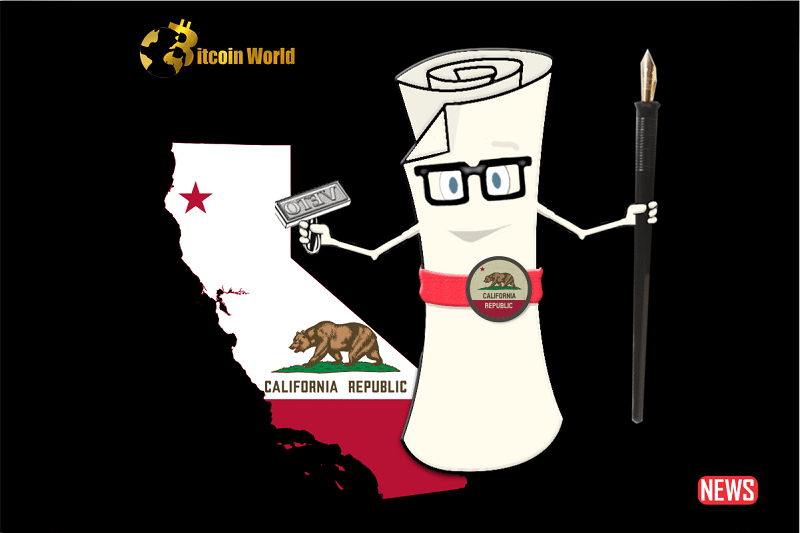Navigating the legal landscape for cryptocurrency can feel like traversing a minefield, right? While the federal debate continues, California is taking a proactive step. This week saw the introduction of Assembly Bill 1229 (AB 1229), spearheaded by Assemblymember Matt Haney. The goal? To create a clear pathway for Decentralized Autonomous Organizations (DAOs) to operate legally within the state.
What’s the Big Idea Behind AB 1229?
Imagine a world where DAOs can function with the same legal certainty as traditional businesses. That’s precisely what AB 1229 aims to achieve. It proposes a new business entity structure called a Decentralized Nonprofit Organization (DNPA). Think of it as a tailored legal framework designed specifically for DAOs, allowing them to:
- Formally establish themselves as a legal entity.
- Pay taxes transparently and compliantly.
- Crucially, limit the personal liability of their participants.
This initiative is largely driven by the need for clarity in a rapidly evolving space. Miles Jennings, the General Counsel at the prominent venture capital firm a16z (who sponsored the bill), has been instrumental in its development. His perspective is clear: “There’s a lot of uncertainty in this space. What [entrepreneurs] need is certainty so that they can plan on how to build and spend less time worrying about these legal issues.”

Why Now? The Urgency for DAO Clarity
The timing of AB 1229 is significant. Recent enforcement actions have cast a shadow over the DAO landscape. Remember the Commodity Futures Trading Commission (CFTC) action last year? It targeted a DAO’s token holders for offering leveraged and margined commodity transactions. This sent ripples of concern through the crypto community, with governance voters questioning their potential liability for DAO actions.
AB 1229 offers a potential solution, aiming to provide that much-needed clarity and shield participants from liability based solely on their affiliation with the DNPA.
Is State-Level Regulation the Answer?
While federal cryptocurrency regulation remains a hot topic, Jennings believes focusing on state-level solutions like AB 1229 is a more pragmatic approach. “This is a problem that is a little bit more tangible and ready to be solved because there are existing legal structures that can be modified,” he explains. “It’s not quite as difficult as, say, changing securities laws.”
Who Will Benefit from the DNPA Structure?
It’s important to understand that AB 1229 isn’t a one-size-fits-all solution for every crypto organization. Jennings clarifies that it’s primarily intended for:
- Protocols and blockchain networks that utilize voting to control autonomous software.
- Think of examples like Uniswap and Optimism, both of which a16z has invested in.
However, it’s not designed for:
- Investment groups built around blockchain tokens.
- Social clubs operating on a blockchain.
- Traditional businesses attempting to masquerade as decentralized entities. As Jennings puts it, “You can’t put in a big management team and then have a giant hierarchy. This entity structure is not intended to be a replacement for the next Google, which will have 100,000 engineers.”
Can DNPA Members Still Profit?
Absolutely! While the DNPA structure isn’t about direct dividend payouts like traditional corporations, there are other avenues for token holders to benefit financially. Jennings highlights a couple of examples:
- Uniswap (UNI) Token: Holding UNI could potentially enhance the profitability of providing liquidity on the platform.
- Aave Token: The Aave token, used in a lending protocol, can be used to backstop risk through the Safety Module.
What’s Next for AB 1229?
The bill is making its way through the California legislature. It recently cleared the Banking and Finance Committee and is now headed to the Judiciary Committee. If all goes according to plan, it will then proceed to the State Senate. Jennings is optimistic, suggesting that Governor Gavin Newsom could potentially sign the bill into law within six to eight months, assuming it successfully navigates the legislative process.
The Bottom Line: A Step Towards a Clearer Future for DAOs
AB 1229 represents a significant step towards providing much-needed regulatory clarity for DAOs. By establishing the DNPA framework, California is potentially paving the way for more secure, transparent, and legally sound decentralized organizations. While the federal landscape remains uncertain, this state-level initiative offers a tangible solution to address the current ambiguities surrounding DAOs, fostering innovation and growth within the cryptocurrency ecosystem.
Disclaimer: The information provided is not trading advice, Bitcoinworld.co.in holds no liability for any investments made based on the information provided on this page. We strongly recommend independent research and/or consultation with a qualified professional before making any investment decisions.




